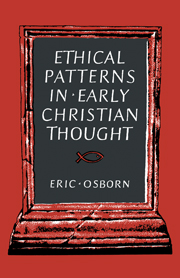Preface
Published online by Cambridge University Press: 12 November 2009
Summary
At the end of ‘Christian Ethics and Contemporary Philosophy’, the editor, I. T. Ramsey, stressed the urgent need for ‘such a thorough biblical and patristic study, including a study of Christian moral theology down the ages, as enables us both to formulate the most reliable Christian principles and the moral obligations they express, relating this understanding to some key-phrase in terms of which the full Christian commitment is given’. This book springs from a sense of the same need. It begins with an account of the function of ethical patterns. After the historical background and New Testament beginnings, the ethics of Clement of Alexandria, Basil, John Chrysostom and Augustine are examined. The four patterns of righteousness, discipleship, faith and love are seen in the distinctive thought of each writer. Exposition is tied to text because ethical terms are either ambiguous or meaningless when lifted out of context. Two necessary features of any Christian ethic emerge–a respect for the contingent and a challenge to perfection.
The obstacles to a work of this scope are considerable; there is too much material. The New Testament possesses an ethical complexity which has been carefully explored. Clement's writings are oriented to ethics and intricate in content. Basil poses questions to which there are no answers. Suidas said that it was for God, not man, to know all that John Chrysostom had written; Isidore of Seville confidently asserted that anyone who claimed to have read all of Augustine was a liar.
- Type
- Chapter
- Information
- Ethical Patterns in Early Christian Thought , pp. vii - viiiPublisher: Cambridge University PressPrint publication year: 1976



